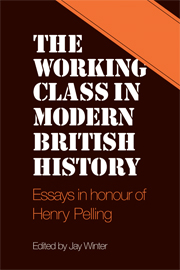Book contents
- Frontmatter
- Contents
- Introduction: labour history and labour historians
- I The working class in British politics
- 1 The social democratic theory of the class struggle
- 2 Keir Hardie and the Labour Leader, 1893–1903
- 3 Winston Churchill and the working class, 1900–14
- 4 Expectations born to death: local Labour party expansion in the 1920s
- 5 Post-war reconstruction in Wales, 1918 and 1945
- 6 Imperialism and the Labour government of 1945–51
- II The working class in British society
- List of the published writings of Henry Felling
- Notes
- Index
4 - Expectations born to death: local Labour party expansion in the 1920s
Published online by Cambridge University Press: 05 November 2011
- Frontmatter
- Contents
- Introduction: labour history and labour historians
- I The working class in British politics
- 1 The social democratic theory of the class struggle
- 2 Keir Hardie and the Labour Leader, 1893–1903
- 3 Winston Churchill and the working class, 1900–14
- 4 Expectations born to death: local Labour party expansion in the 1920s
- 5 Post-war reconstruction in Wales, 1918 and 1945
- 6 Imperialism and the Labour government of 1945–51
- II The working class in British society
- List of the published writings of Henry Felling
- Notes
- Index
Summary
‘The Labour Party knocks the heart out of me’, Ramsay MacDonald wrote in 1921, ‘and expectations are like babies born to death and should not be created’. This characteristically self-indulgent complaint was more perceptive than MacDonald may have realized. By the end of 1921, Labour's leaders had created expectations of political and social advance which they could not realistically hope to fulfil except by abandoning the unrestrained idealism which had won converts and stirred enthusiasm during the last year or so of war and the first years of peace. This article will examine the fading of expectations within local Labour parties during the first post-war decade.
The senior midwife of the ‘babies born to death’ was Arthur Henderson. In 1918 he and Sidney Webb had created more than the Labour party constitution; they had given official approval, through the National Executive Committee (NEC), to the notion that a Labour government was an imminent possibility. Such hopes were obviously raised after the Russian revolutions and may have been partly justified early in 1918. The failure of the alternative vote clause of the Franchise Bill ‘immensely worsened’ Labour's chances, though, and the Ludendorff Offensive on the western front in the spring of 1918 almost killed them altogether. However, at the party conference of June 1918, when Labour still hoped to gain credit for a negotiated peace, Henderson and Webb showed the delegates an electoral Canaan and by so doing engineered the approval, almost without thought, of an extremely broad party programme.
- Type
- Chapter
- Information
- The Working Class in Modern British HistoryEssays in Honour of Henry Pelling, pp. 65 - 81Publisher: Cambridge University PressPrint publication year: 1983
- 9
- Cited by

